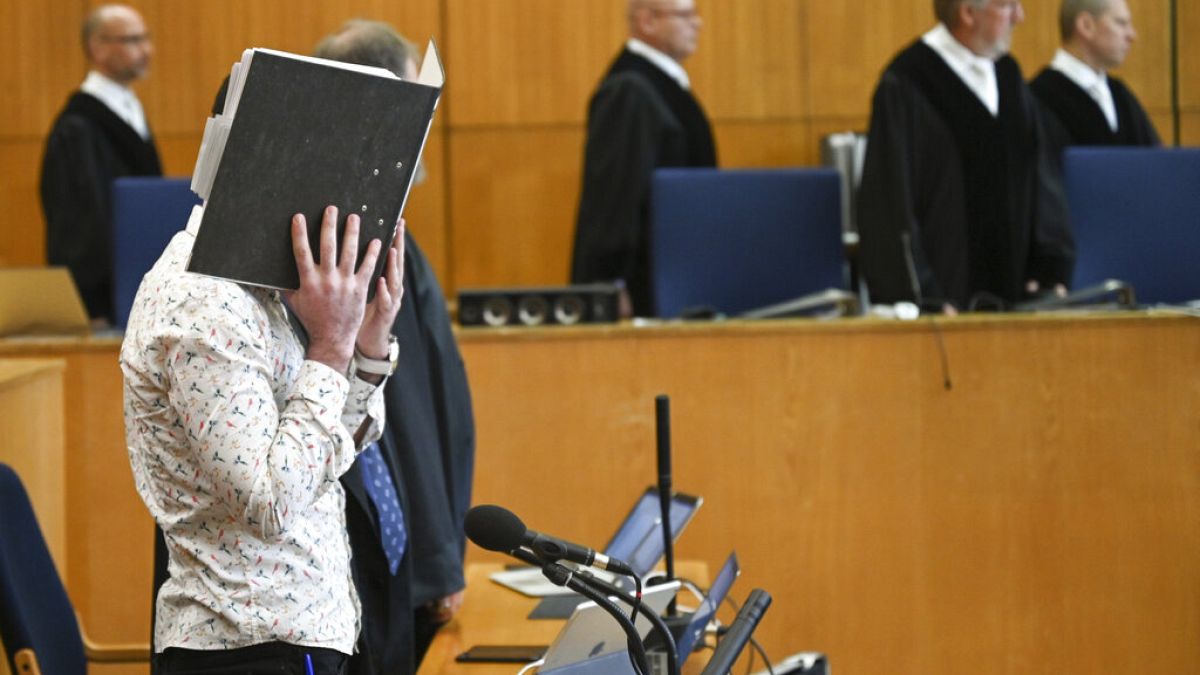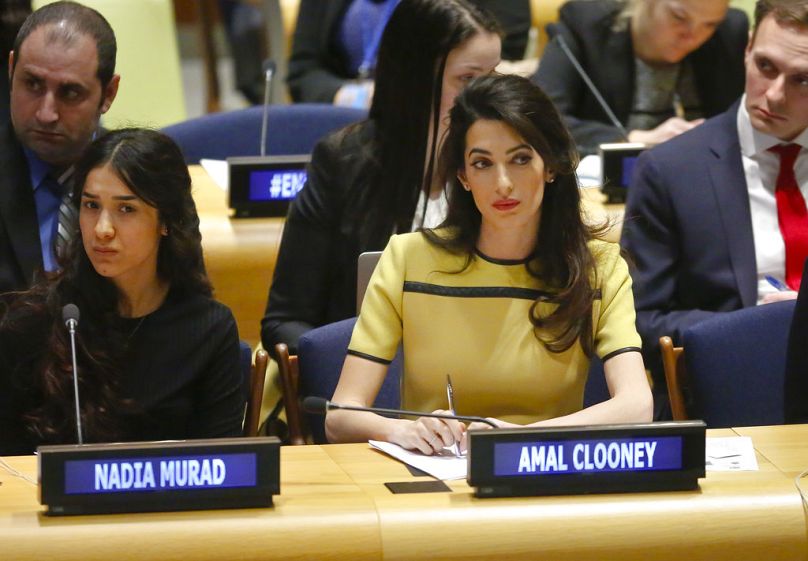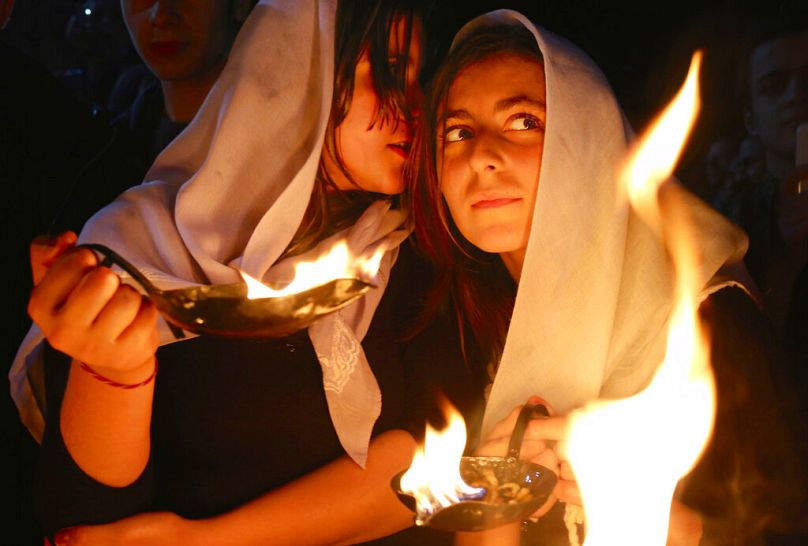"It has been seven years since survivors have been waiting for this," Yazda NGO told Euronews.
An unprecedented trial is due to end on Tuesday in Frankfurt, Germany.
Taha Al-J. is the first alleged jihadist prosecuted for genocide against the Yazidis.
The Kurdish-speaking minority was persecuted and enslaved by members of the self-proclaimed Islamic State (IS) group in Iraq and in Syria, when jihadists controlled large swathes of the Middle Eastern countries' territories.
An estimated 10,000 Yazidi people were killed in northern Iraq in the mass atrocities. About 7,000 Yazidi women and girls, some as young as nine, were enslaved and forcibly transferred to locations in Iraq and eastern Syria.
Prosecutors say Taha Al-J., a former IS member, enslaved a Yazidi girl and her mother in Iraq, then tortured and murdered the 5-year old child in 2015.
If the Frankfurt court concludes that Taha Al-J. committed genocide, "then it will be the first time that a legal court says that crimes against Yazidis by IS are genocide," said Natia Navrouzov, Legal Advocacy Director at global Yazidi NGO Yazda.
While the crimes have been recognised by the United Nations as amounting to genocide, as well as a few other international and national bodies, "it hasn't happened yet that a court of law has said what happened to the Yazidis is a genocide," the lawyer noted.
"For the victims, it would be something really fabulous. You know, it has been seven years since they've been waiting for this. So it would be a great milestone for us," she told Euronews.
Euronews explores the implications of the landmark case for the Yazidis' long quest for justice and the role European countries play in the process.
What is Taha Al-J. accused of?
Taha Al-J. is an Iraqi national who is believed to have joined IS in 2013. He and his wife Jennifer W., a German national, were allegedly members of the Hisbah, IS' moral police.
German prosecutors say Taha Al-J. and Jennifer W. "purchased" a Yazidi woman and her 5-year old child, Rania, as household "slaves" in Mosul in 2015.
He is suspected of prohibiting the girl and her mother from exercising their religion, forcing them to convert to Islam.
The plaintiff's lawyers also say the two were "subjected to almost daily beatings."
One day, after the girl fell ill and wet her mattress, Taha Al-J. chained her up outside as punishment and let her die in the scorching heat, prosecutors said.
Navrouzov told Euronews that the girl died as a consequence of the heat, thirst and malnourishment.
"She was just weak overall," she said."And the mother was there, so she saw it," the lawyer added.
The mother of the child has been a key witness in the case and is represented by lawyers Amal Clooney and Natalie von Wistinghausen at the trial.
Taha Al-J.'s wife, Jennifer W. was recently convicted in a separate trial in Munich for failing to undertake any steps to prevent the death of the child, despite witnessing her husband's act.
Taha Al-J. was arrested in Greece in May 2019 as he was reportedly trying to apply for refugee status.
"Since Germany had already started the investigation against Jennifer W., who was his wife, it asked for the extradition of Taha Al-J.," since both cases are linked, Navrouzov explained.
He was indicted in early 2020 and faces charges of having committed genocide, crimes against humanity, murder and human trafficking as a member of a terrorist organisation.
His trial started in April 2020. If convicted, Taha Al-J. faces life imprisonment.
Reached by Euronews, Taha Al-J.'s lawyer Serkan Alkan said he and fellow defence lawyer Martin Heising "deny the charges because we have the feeling our client is used as a representative for the crimes of IS."
Alkan argued that a lot of information was missing, "up to the point that it is not clear if anyone has died. We don't have hard proof for this."
"Furthermore, we think in legal terms in no way he has fulfilled the requirements of the international criminal law," he added.
What would be the significance of a genocide verdict?
If the Frankfurt court concludes that Taha Al-J. committed genocide, "we hope that this will have a domino effect, that this will lead to more trials like this one," said Navrouzov.
But Navrouzov was far from taking a genocide verdict for granted in this case.
"As a lawyer, I know how hard it is to prove genocide," said Navrouzov.
"Of course we know IS committed genocide against the Yazidi. But in every trial, you have to prove that this particular person had the intent to commit genocide against the Yazidis. And I think that's always very hard to prove."
"The court has to be careful about the way they will communicate on this," she warned.
"If they conclude that they don't have enough proof for that, they need to make sure they communicate to the Yazidi community in the correct way and tell them 'we are not saying there is no genocide against the Yazidis'. We're just saying that for this particular person, there's not enough proof to say that he had the intent to commit genocide."
Why is the trial taking place in Germany?
"Taha is Iraqi. The victim is Iraqi. The crimes happened in Iraq. But still, Germany, thanks to the universal jurisdiction principle, can prosecute," Navrouzov explained.
Under this principle, Berlin allows its court to prosecute crimes against humanity committed anywhere in the world.
But even European countries that do not have universal jurisdiction could prosecute their nationals who were so-called "foreign fighters" in Iraq and Syria, the lawyer added.
Navrouzov told Euronews that Germany is "way ahead of other countries" as the only nation prosecuting individual IS members.
France launched a case against the Lafarge company, which is accused of paying millions of euros to jihadist groups in order to keep its cement factory in Syria running through the early years of the war. But the case centres on the liability of a company rather than on individual IS members.
Outside Europe, Iraq is "of course" prosecuting IS members, Navrouzov said, but only for membership to a terrorist group.
"Unfortunately, in Iraq, there is no legal framework to prosecute them for international crimes, genocide, war crimes and crimes against humanity," the lawyer noted. "This is not the justice the victims want and hope to see."
What are the challenges in bringing such crimes to justice?
Since 2014, Yazda has been relentlessly documenting the crimes against the Yazidi minority, collecting the testimonies of over 2,000 victims.
The non-profit has played an instrumental role in the Taha Al-J. case. "We have identified the only victim and the only witness, and we were able to connect her through our legal team to the German prosecutors and war crimes unit, "Navrouzov told Euronews.
Those who work to bring the perpetrators of the Yazidi genocide to justice are facing multiple challenges, the lawyer said.
"One of the main challenges is to identify the whereabouts of the perpetrators. Where are they? Are they in custody? If yes, where and if we know where they are, is the country willing to prosecute them?" Navrouzov asked.
"And another big challenge is to link the IS members to their real identity because IS members were using kunyas or war names. And we have thousands of kunyas, war names mentioned in the statements we have collected. But it's really hard to link them to a real person and then try to understand if it is the same as the name mentioned in the victims' statements," she went on.
But the key challenge is above all "political," Navrouzov said.
"European countries have been very reluctant to repatriate their nationals from Iraq and Syria to prosecute them, for different reasons -- the security of the country, the public opinion is against it, etc."
"Another argument is that they don't have the evidence to prosecute them. So they're afraid that if they bring them back, they will have to release them very quickly because they don't have anything against them."
"So this is the gap we're trying to fill. We reach out to these countries and we say, 'these people have also committed crimes against Yazidis, and that means that they can be prosecuted not only for membership to a terrorist group, but also for genocide and crimes against humanity, war crimes, which means that their sentence will be higher. And it also means that they will be prosecuted in a way that is what Yazidi victims are looking for and are hoping for."
"Europe does not seem ready for the moment. But I also think that it's not a sustainable situation. They cannot keep ignoring this issue," Navrouzov said.




